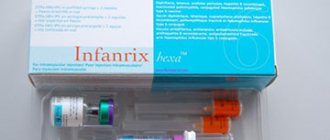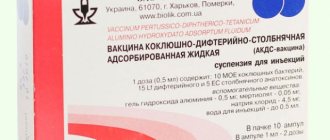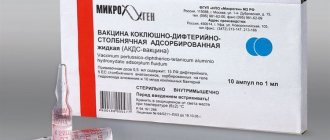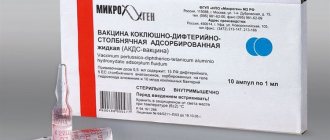I was asked to write an unbiased article about vaccinations. Talk about them so that every mother can decide for herself whether she needs to vaccinate her child. I thought about it and decided to seek help from statistics, photographs and data on attitudes towards vaccinations in other countries. This article is facts about vaccinations, but decide for yourself whether to vaccinate your child or not.
Download a checklist with the main contraindications to vaccinations.
The National Vaccination Calendar identifies several main diseases: viral hepatitis B, tuberculosis, whooping cough, diphtheria, tetanus, polio, rubella, measles, mumps.
Regulatory framework
The list of vaccinations for children of the newborn period (28 days), as well as for all subsequent ages, is regulated by the federal law “On the immunoprophylaxis of infectious diseases”, the Russian Federation law “On the sanitary and epidemiological welfare of the population” and the federal law “Fundamentals of the legislation of the Russian Federation on the protection of the health of citizens” . All these documents do not prohibit parents (or guardians) from opposing vaccination and refusing vaccinations.
In order for a newborn child not to be vaccinated in the maternity hospital, it is necessary to prepare 2 copies of an application for refusal of biological tests and vaccines before arriving at the maternity hospital. It is filled out according to the form; the date and signature of the applicant are required at the bottom. Upon admission to the maternity hospital, the document is presented to the chief physician. It is important to ensure that both copies are stamped and signed, and that the receipt is reflected in the incoming documentation log.
Then one application is attached to the medical record, the second remains in the hands of the woman in labor. To avoid problems, it is worth verbally warning medical personnel about the refusal and the presence of a statement, which by chance may not be noticed.
Current legislation does not indicate any consequences for parents who refuse to vaccinate. Therefore, the statement of the expectant mother cannot serve as a reason for a longer stay in the maternity hospital than recommended by doctors. Requiring additional certificates and documents, in addition to the application for refusal, is illegal. There is no need to explain or justify your decision.
If it is not possible to solve the problem peacefully, the rights of the mother and child are violated, you should write a statement addressed to the head of the medical institution, a second copy to the district prosecutor’s office, and a third copy to keep in your possession.
This document must contain a complete description of the situation: pressure from staff, refusal to discharge, etc., as well as the applicant’s contact information. The application is sent to the prosecutor's office by registered mail with notification of receipt. If the head physician opposes formalizing the complaint and refuses to sign the document, it must also be sent by mail.
After discharge from the maternity hospital, a similar refusal procedure is carried out at the children's clinic at the place of residence. After submitting the application, parents bear responsibility for the child’s health in relation to the diseases against which vaccination is carried out. Based on regulations, a child who has not received vaccination may be restricted from visiting a child care facility during epidemics or when quarantine is declared. Read more: refusal of vaccinations →
Don Hamilton on the benefits and harms of pet vaccinations
Veterinarians also doubt the need for vaccinations for pets. Dr. Don Hamilton from the USA considers the simple question of the need for such vaccination to be very difficult.
He carefully studied the effects of various vaccinations on animals and came to the conclusion that often live vaccines, judging by the reviews of animal owners, themselves cause diseases against which they are supposed to protect.
Hamilton also advocates the abolition of annual revaccination against some diseases, considering it absolutely useless, since many diseases affect young animals only up to a year.
All information about the need for vaccinations comes only from the vaccine manufacturers themselves.
List of vaccinations for newborns
What vaccinations are given to newborns in the maternity hospital? This list is small:
1.Vaccination against tuberculosis (BCG)
The vaccine is made from weakened bacteria and is given intradermally. In the absence of contraindications, the first vaccination is given from the 3rd to the 7th day of the child’s life, as a rule, this occurs in the maternity hospital. Its action is aimed at developing immunity, protecting the body from the transition of a “dormant” infection into a disease, as well as against the development of severe forms of tuberculosis.
2.Vaccination against hepatitis B
The vaccine is first given within 12 hours after birth and is given intramuscularly. According to the standard scheme, revaccination is carried out twice: after 1 month and after six months. The vaccine is a “yeast” recombinant preparation.
The production technology is based on the implantation of a gene that synthesizes part of the hepatitis B virus into baker's yeast. The proliferation of yeast leads to the proliferation of antigen, which is then purified and tested for sterility. The administered hepatitis B vaccine provokes the production of antibodies that provide immunity to the disease.
General contraindications for vaccination of newborns
General contraindications include:
- Prematurity. Vaccines are not administered if the child’s body weight is less than 2300 g.
- Purulent-septic skin inflammations. The vaccine can be given a month after complete recovery.
- Intrauterine infectious infection, sepsis. Vaccination – six months after recovery.
- Acute diseases. Vaccination is possible a month after recovery.
- Hemolytic disease . The vaccine is administered after six months, provided there is no anemia.
- PPCNS with pronounced manifestations. Vaccination – six months after recovery with the permission of a neurologist.
- Enzymopathies. Complete contraindication.
- Immunodeficiency states. Complete contraindication.
- Generalized BCG infection found in siblings.
The number of contraindications is constantly changing, often decreasing, as vaccines become more advanced. Vaccination is a fairly reliable method of protecting a child from infections. All drugs in the Russian Federation are made under strict control; they undergo clinical trials to confirm their effectiveness and safety.
Common reactions to vaccination: normal and abnormal
Despite the reliability of vaccination, side effects are often inevitable because the child has a milder form of the disease. But not all reactions to vaccination are dangerous. The formation of stable immunity is a positive reaction that is most expected. It protects the body from infections and their consequences.
Negative reactions to vaccination are represented by complications and vaccine reactions. The risk of complications after vaccination is the same as after the initial use of any medicine. In addition, the consequences of infectious diseases, such as death and disability, are more dangerous and occur more frequently than complications from vaccine administration.
General reactions to vaccination are represented by the following symptoms:
- increase in body temperature. Weak reactions – up to 37.5 ºС; medium - 37.6-38.5ºС, strong - from 38.5ºС;
- febrile convulsions - twitching of the limbs due to the reaction of the central nervous system to an increase in temperature. Appear within 24 hours after the procedure;
- afebrile convulsions - twitching of the limbs at normal body temperature. Indicate the presence of a neurological disease; an examination by a neurologist is necessary;
- sleep and appetite disorders;
- deterioration in general health;
- headache;
- pain in the abdomen, joints and muscles;
- nausea and vomiting.
All these symptoms last a maximum of the first 3 days after vaccination. The severity of general reactions depends on which vaccines were administered and on the individual characteristics of the child’s body.
First aid for the manifestation of general vaccination reactions is reduced to eliminating the symptoms. If the body temperature is elevated (more than 38 ºС), it is necessary to wipe with a damp towel and give the child antipyretics: paracetamol, Panadol, Nurofen. After the temperature normalizes, the general condition immediately improves: pain, nausea and vomiting disappear. If antipyretic medications do not help, you need to call an ambulance.
How to protect your baby from adverse reactions
- The injection must be given by a qualified professional.
- The injection must be given under sterile conditions.
- You must adhere to the vaccine dosage recommended in the instructions.
- Before vaccination, the baby must be examined to make sure that he is completely healthy. You cannot vaccinate a child with a fever or acute infectious disease, but even a minor cold is also a contraindication.
Prevention of complications
With careful preparation for vaccination, as well as correct behavior during and after the procedure, you can minimize the risk of complications and unwanted reactions.
Before getting vaccinated you must:
- take urine and blood tests to assess your general health;
- consult with a neurologist and allergist and obtain their opinion;
- check the presence of antipyretic drugs in your home medicine cabinet;
- do not give your child unfamiliar food before the procedure;
- take antiallergic medications within two days before vaccination;
- Bring your vaccination certificate, diaper and your child’s favorite toy to the procedure;
- When leaving home, measure the child’s body temperature; it is unacceptable for it to rise above 37oC.
When carrying out vaccination:
- check the name of the vaccine, manufacturer, expiration date;
- undergo an examination and consultation with a pediatrician before entering the vaccination office. He must assess the general condition of the child, measure the temperature, listen to the lungs, examine the throat;
- do not worry, do not fuss - these conditions will quickly be transmitted to the child and will set him against the procedure;
- let the child cry, then hold him close, rock him - do what calms him down.
When the “worst” is over:
- stay in the clinic for half an hour after vaccination, even if they forgot to warn you about it;
- if the temperature rises, remove the child’s clothes and wipe with a wet diaper at room temperature;
- do not abuse antipyretic drugs, monitor the dosage;
- do not use aspirin under 5 years of age;
- do not bathe your child or go for a walk on the day of vaccination;
- You can change your diet only 3 days after vaccination.
In order to decide whether to vaccinate newborns, you need to weigh the pros and cons. In any case, the choice remains with the parents. But we must remember that if they refuse vaccination, all responsibility will lie with them.
Today, access to information allows you to comprehensively study the problem and make the right decision. The doctor’s task in this situation is to tell about the possible consequences of refusal, about what complications there may be after the procedure, without exerting pressure or inclining towards a certain decision.
Author: Olga Khanova, doctor, especially for Mama66.ru
Summary
If you refuse to vaccinate just because you hope nothing will happen to your child (after all, most children around him are vaccinated), you are exposing him to additional danger.
You want to avoid additional risk, but do not take into account that in a possible epidemic, it will be your child who will suffer more than others. Trusting anyone's word is a fundamentally wrong approach! Always doubt everything: scientific achievements, any innovations, the competence of doctors and advisers. Be sure to look for confirmation of your guesses in different sources. Only complete and objective information will allow you to make the right decision and maintain the health of yourself and your children.











